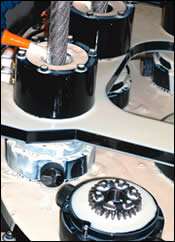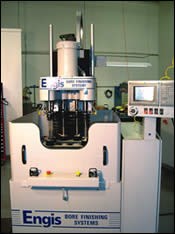Bore Finishing Machine Increases Uptime
Tight tolerances are extremely important in gear manufacturing, and even more so when those gears are used in performance motorcycle transmissions. The ability to manufacture as competitively as possible is also a critical factor to consider.
Tight tolerances are extremely important in gear manufacturing, and even more so when those gears are used in performance motorcycle transmissions. The ability to manufacture as competitively as possible is also a critical factor to consider. This was the position a motorcycle component supplier (in Pune, India) faced when it contacted Engis Corp. (Wheeling, Illinois) about single-pass bore finishing.
“The first alternative the company considered was installing a number of conventional honing machines, where multiple passes of an expanding mandrel achieve a precision finish,” explains Robert Marvin, Engis product manager. “The company also had to be as cost-competitive as possible in producing these parts, which led to discussing single-pass bore finishing.”
Featured Content
A rapidly evolving machining technology is surpassing conventional honing as the preferred process for finishing ID parts such as gears. Diamond-plated and superabrasive single-pass bore-finishing technology from Engis holds extremely tight tolerances reliably and consistently at a lower overall cost per finished piece, according to the company. These superabrasive bore-finishing tools are capable of achieving bore geometries to within 0.00050 mm in standard, blind and semi-blind bores.
The spec requirements for the motorcycle component supplier included removing 0.050 mm of material from a 20-mm gear made of hardened steel (Rc 58-64). Bore tolerance was 0.015 mm, the finish requirement was 0.8 Ra, and cylindricity needed to be held to 0.008 mm.
Because of its tight-tolerance requirements, the motorcycle component supplier decided to purchase two single-pass Engis SPM series machines, which are designed for finishing parts with bore sizes of 38.1 mm and below, configured with six spindles that are able to finish two parts at a time.
Conventional honing uses a hone that reciprocates many times while expanding and contracting the cutting stones during each cycle. By comparison, single-pass bore finishing on an SPM series machine is performed with preset, barrel-shaped tools that pass once through the bore while the tool, part or both rotate. As the single-pass bore-finishing tool need not expand or contract over the finishing cycle, the system maintains maximum control over bore size and finish. As the diamond coating cuts cooler and maintains an extremely long tool life, overall production costs per finished part are reduced. For the motorcycle component supplier, actual bore tolerance achieved was 0.007 mm, with a 0.6-Ra finish and 0.005-mm cylindricity.
With two single-pass SPM machines, the motorcycle component supplier is producing 14,000 gears per day. Where conventional honing machines would require taking the machine out of service every 2,000 pieces to change tooling, the slow-wearing superabrasive diamond coating can routinely finish more than 60,000 parts, even in hardened steel. Since the tooling finishes the full periphery of the bore, interruptions such as keyways or splines do not affect performance.
“The result is much more machine uptime and a tool cost reduction of more than 50 percent while providing the precision finish these gears require,” Mr. Marvin explains. “Total perishable tooling costs are approximately 1 cent per finished gear.”
RELATED CONTENT
-
Reinventing the Wheel with Robot-Automated CNC Multitasking
One race team discovers how to efficiently manufacture a new wheel nut design for the next-generation NASCAR stock car with the help of a CNC mill/turn and a built-in robot.
-
The Dirt On Cleaner Crankshafts
A high-pressure waterjet blasts away burrs and machining residues that resist more traditional cleaning methods.
-
Single Pass Honing System with Automatic Tool Wear Compensation
Single pass honing, also referred to as diamond bore sizing, is a good way to produce parts economically when the bore is small or has thin-walled members that need to be honed.








